Best Turmeric Supplements of 2023
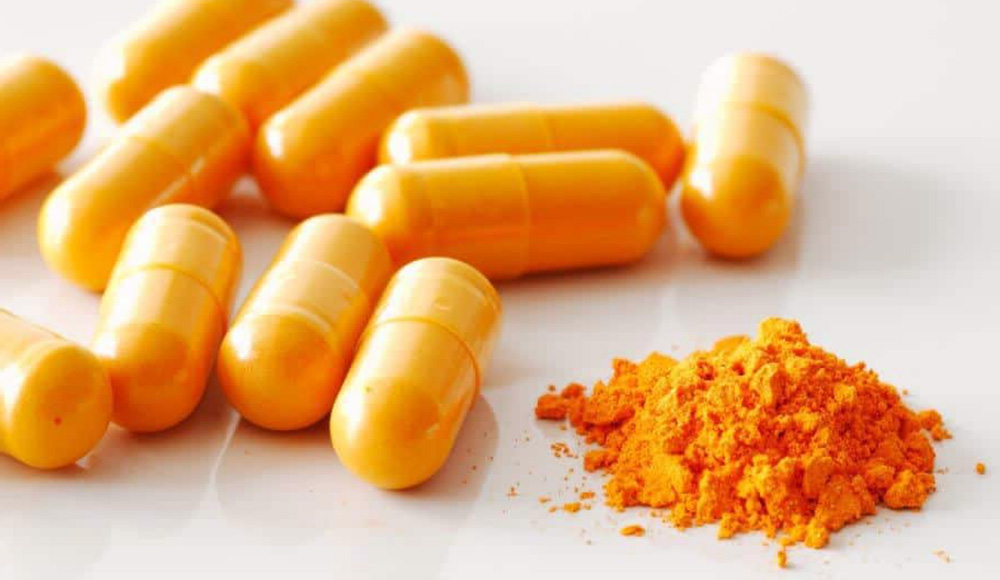
Turmeric is a flowering plant cultivated largely in Southeast Asia, Oceania and India, (the world’s largest producer and consumer of turmeric). Turmeric is used both as a spice in cooking and as a component of many traditional forms of medicine.
Turmeric has been recognized for centuries for its ability to treat various respiratory conditions, arthritis, diabetes, liver disorders and more and is renowned for its anti-inflammatory properties. Below are the 10 best turmeric supplements on the market today.
1. Bio Schwartz Turmeric Curcumin with Bioperine 1500mg
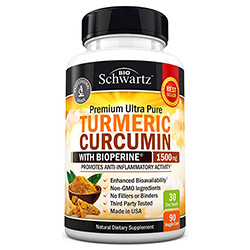
Our first choice is Bio Schwartz Turmeric Curcumin with Bioperine which provides a very robust 1,350mg of turmeric per capsule. Riding shotgun in each capsule is 150mg of turmeric extract, which is very high potency, along with 10mg of bioperine, which is a fancy name for black pepper fruit extract which helps enhance both bioavailability and absorption.
Each bottle contains 30 veggie capsules which are entirely free of fillers, binders, soy, dairy, corn, shellfish and genetically modified organisms of any kind. The end product is one that can help you deal with the pain of arthritis, enhance cognitive function, fight the free radicals that prey on your healthy cells and achieve a higher degree of cardiovascular health.
2. Nature’s Nutrition Turmeric Curcumin Max Potency
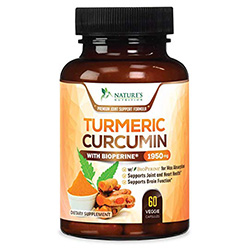
Turmeric Curcumin Max Potency from Nature’s Nutrition provides 1,800mg of turmeric curcumin along with 15mg of black pepper extract to enhance absorption and facilitate bioavailability. Inflammation is an immune system response to systemic irritants and Nature’s Nutrition Turmeric Max Potency attacks inflammation and promotes heart, joint and brain health in the process.
Max Potency is also rich in antioxidants that attack free radicals and enable more robust health and physiological integrity on a cellular level. Max Potency is 100% free of genetically modified organisms and contains no soy, gluten, wheat, artificial sweeteners, sugar, milk or shellfish. Each veggie capsule is teeming with potent turmeric curcuminoids your body needs and free of the additives and artificial fillers it doesn’t.
3. Organic India Turmeric Formula
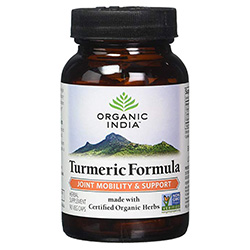
Turmeric is an outstanding anti-inflammatory that helps you recover from injuries faster, reduce the negative effects of various health conditions and spend less time recovering from strenuous workouts. Organic India Turmeric is the result of a sustained commitment on behalf of the company to the type of regenerative agriculture that empowers family farmers and creates more prosperous villages.
Organic India Turmeric features enhanced bioavailability, is rich in antioxidants and is fortified with curcuminoid extract that is renowned for its anti-inflammatory abilities. It is also 100% free of all forms of genetically modified organisms (GMOs). You won’t find any harmful additives or fillers, no artificial flavors or colors and you can rest easy knowing this supplement is both vegan and vegetarian safe.
4. Sports Research Turmeric Curcumin C3 Complex
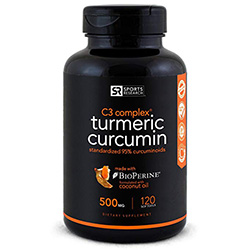
Sports Research, as their name implies, formulate their Turmeric Curcumin C3 Complex specifically to help athletes and the athletically inclined. It’s designed to help them recover faster from strenuous workouts, build healthier stronger joints, improve cardiovascular performance and neutralize free radicals before they can interfere with cell production.
C3 from Sports Research uses organic coconut oil and bioperine to promote absorption and enhance bioavailability. There are zero artificial ingredients at work here. Including no genetically modified organisms (GMOs) and no artificial flavors, colors or preservatives. Sports Research C3 Turmeric is also free of gluten, dairy, fish, soy, shellfish, yeast, fillers and binders and is wrapped in a softgel capsule that is certified kosher.
5. VitaBreeze Turmeric Curcumin Complex with Black Pepper Extract
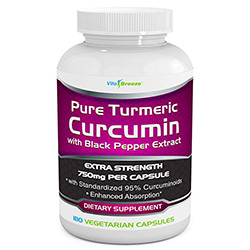
VitaBreeze Turmeric Curcumin Complex features 95% curcuminoids that enhance antioxidant benefits, increase bioavailability and buttress the natural anti-inflammatory properties of turmeric. While we’re not crazy about the fact that VitaBreeze shields some of their ingredient formulation behind the “proprietary blend” label there’s no denying this is a high potency, high efficiency supplement.
One that will allow you to transcend various physical difficulties while at the same time providing cardiovascular and respiratory benefits. Free of gluten, soy, milk, shellfish, wheat, peanuts and other potential irritants and allergens VitaBreeze Turmeric Curcumin Complex is produced in the USA in an FDA certified facility.
6. Zhou Nutrition Turmeric Curcumin and Ginger with Bioperine

Zhou Nutrition makes a lot of outstanding supplements so it’s no surprise they’d hit this one out of the park. Their Turmeric Curcumin with Ginger and Bioperine is among the most potent you’ll find with bioavailability enhanced by way of black pepper extract (bioperine) and ginger root extract. Ginger also provides additional anti-inflammatory capabilities while promoting joint health, cognitive function and cellular integrity.
Ginger has been used for centuries in the East to facilitate greater mobility in older people and now younger ones can enjoy the same benefits when recovering from their workouts, runs or other athletic activities. With 1,500mg of turmeric Zhou is not fooling around with this supplement.
7. Vimerson Health Turmeric Curcumin
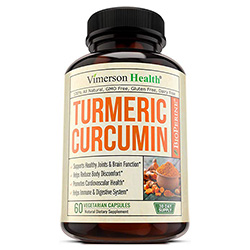
Vimerson Health produces their Turmeric Curcumin in a Good Manufacturing Practice (GMP) certified facility in the US where it is subjected to much higher standards of quality than supplements produced in most overseas factories. The resulting Turmeric Curcumin with bioperine boast extremely high potency and purity and does an outstanding job relieving joint pain caused by osteo or rheumatoid arthritis or strenuous exercise.
Vimerson Health Turmeric contains no artificial ingredients, GMOs, hormones, antibiotics and preservatives. Instead what it contains is 95% standardized curcuminoids, black pepper extract (bioperine) to aid in digestion and to enhance bioavailability and a wealth of free radical-fighting antioxidants. Curcuminoids are derived from curcumin and are known to be particularly rich in antioxidants. They are also known for their outstanding anti-inflammatory abilities.
8. MegaFood Turmeric Strength For Whole Body
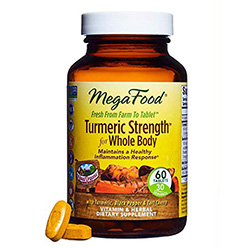
The final entry on our list of best turmeric supplements is from MegaFood. Their Turmeric Strength for Whole Body starts with a foundation of turmeric root extract and bioperine and adds vitamin C, holy basil leaf extract and a blend of other organic fruits.
These not only help reduce inflammation and improve absorption but also provide your body with vital nutrients it needs to help keep an array of potential ailments at bay. MegaFood Turmeric is absorbed quickly by the body and goes to work immediately strengthening the immune system, reducing inflammation and enhancing mental clarity and focus. It contains no GMOs and is certified vegan, kosher and pesticide free.
FAQs
What are the Benefits of Turmeric Supplements?
The benefits of turmeric supplements include but are not limited to:
- Reduced inflammation – Inflammation is what causes pain and stiffness in the body. It is an immune system response to infiltration of foreign organisms like viruses and bacteria (1). In some cases however, the immune system is tricked into responding to an external threat that is not there. Rheumatoid arthritis is a classic example of that and there are many others. Such cases can produce extensive and painful inflammation that only exacerbates the situation. For thousands of years traditional healers have relied on Turmeric to help reduce inflammation. By relieving inflammation turmeric makes dealing with the underlying cause – whether it be arthritis or pain and stiffness from a strenuous workout – that much easier.
- Antioxidant benefits – The discovery of free radicals dramatically changed the way science views aging and illness. Free radicals are oxygen cells that have split into single atoms that are devoid of a paired electron. Since electrons by default seek to be paired these new electron-free atoms scour the body looking for electrons they can rob from healthy cells. These rouge cells are called “free radicals” and they are believed to be associated with all manner of disease including Parkinson’s and many forms of cancer. Antioxidants attack and neutralize free radicals (2) which often has a cascade of positive effects on everything from aging to disease prevention.
- Improved cardiovascular health – Curcumin is now widely believed by the medical community to have a positive effect on overall cardiovascular health. The NIH itself has concluded that curcumin “has the potential to act as a therapeutic agent for the attenuation of NE-induced cardiac cell death” (3). In other words, curcumin can help prevent the death of heart cells that lead to life threatening conditions like cardiomyopathy. That’s heady stuff and should not be ignored by anyone interested in improving their overall cardiovascular health.
- Fighting Alzheimer’s – At this point the exact role of turmeric in helping to break up or prevent the formation of the amyloid-beta plaques that are believed to cause Alzheimer’s disease are unknown. What is known is that Asian populations with diets high in turmeric have a noticeably lower rates of dementia than most Western populations. While more study is needed that fact alone warrants serious attention.
- Reduced pain and inflammation from arthritis – Arthritis takes two principal forms – osteoarthritis and rheumatoid arthritis – and both are characterized by painful swelling of the joints. Turmeric is known for its anti-inflammatory capabilities which makes it an ideal supplement for those suffering from the pain and stiffness associated with arthritis. To be sure turmeric won’t cure arthritis, but what it can do is help make your situation far less painful and restrictive.
- Cancer prevention – Those are two big words, we know. And there is as of this writing no cure for cancer. However, there are certainly ways one can reduce the odds that they will develop cancer at some point in their life. For instance, non-smokers have far less chance of developing lung cancer than smokers. Turmeric has shown promise as a potential treatment for certain types of cancer such as breast cancer, bowel cancer and skin cancer (4). More study however is needed to understand the exact nature of its anti-cancer mechanism and whether it can be parlayed into an effective cancer treatment.
How are Curcumin and Turmeric Related?
Curcumin is part of the turmeric compound. It gives turmeric its distinctive yellow/orange hue and also plays an essential role in the ability of turmeric to produce anti-inflammatory effects. The words turmeric and curcumin are often used interchangeably, however, which can cause confusion. But essentially they are two parts of the same whole. Curcuminoids are derivatives of curcumin that are known to be particularly rich in antioxidants, so you will often see turmeric supplements boasting of their high concentrations of curcuminoids.
When Should I Use a Turmeric Supplement?
There are a number of reasons why a person would decide to start taking a turmeric supplement, including:
- To reduce pain and swelling related to arthritis – This is one of the most common reasons people start taking turmeric supplements and it makes perfect sense, given the proven ability of turmeric to reduce inflammation.
- After strenuous workouts – In recent years athletes and the athletically inclined have discovered that by taking turmeric supplements they can stave off much of the soreness that typically occurs in the wake of strenuous physical activity.
- To treat depression – Turmeric is gaining widespread credibility as a potentially effective treatment for some forms of clinical depression (5). While the jury is still out on the best way to deploy turmeric in such cases, many people are taking turmeric supplements to help them deal with depressive symptoms.
- To treat liver damage from excessive drinking – When people drink to excess their liver is typically one of the biggest victims. Many who are lucky enough to stop drinking experience significant reversals of fortune in most aspects of their life but are often left with liver damage that can undermine their overall health. Researchers were able to demonstrate that turmeric can slow the progression of liver disease in mice (6). Though more extensive human testing is needed.
How Should I Take Turmeric Supplements?
Turmeric supplements come in several different forms including teas, extracts, pills and capsules. That said, capsules are certainly the most common form of turmeric supplement, largely because they are affordable, convenient and allow you precise control over how much turmeric you take. Most are also free of other ingredients, additives and artificial fillers, flavors and sweeteners that could undermine their effectiveness.
What is the Recommended Dosage for Turmeric?
Exactly how much will be right for you depends on your situation, your physical size and the type of turmeric supplement you intend to take. Most turmeric supplements will have a recommended dose on the bottle and we would strongly advise that you do not exceed this recommendation. If you are in any way unsure you may want to start slowly, with perhaps a single 500 mg capsule per day, and see how things go. The smartest approach however, if you have any questions about what would be an appropriate dosage for you, is to consult your doctor.
Is Turmeric Safe for Pregnant Women?
In general, low level turmeric intake is considered safe; with the emphasis on low. The caution is not born of any particular scientific evidence pointing to a health threat but stems more from the fact that pregnant women should be extra cautious about anything they ingest. It should be said however, that while avoiding large doses of any supplement, including turmeric, during pregnancy is no doubt a wise decision, there is preliminary data suggesting that turmeric/curcumin may be able to reduce some of the more odious symptoms of PMS (7).
Should Diabetics Take Turmeric?
The body of the diabetic is unable to regulate blood sugar levels due to either low levels of insulin or insulin resistance. Type I diabetes is the result of the body being unable to produce sufficient quantities of insulin, while Type II diabetes is the result of the body developing a resistance to insulin over time. Type II diabetes is often referred to as “adult onset diabetes” and tends to affect overweight individuals more frequently than others.
The ability of turmeric to regulate blood sugar levels has long been claimed by its proponents and in recent years a series of controlled studies seemed to verify those claims (8). The exact mechanism by which turmeric and/or curcumin are able to do this are not fully understood yet, but the data definitely supports the notion that turmeric can be an effective method for helping to stabilize blood glucose levels, particularly in those with Type II diabetes.
Does Turmeric Have Any Side Effects?
While most people who take turmeric supplements experience no noticeable side effects it is not out of the question that some people will. In such cases side effects tend to be mild to potentially annoying but rarely if ever serious. Such side effects may include:
- Skin rash – In most cases if someone experiences a skin rash after taking turmeric it is the result of an allergic reaction. Such instances however are very rare. If you do notice a rash after taking turmeric stop taking it and consult your doctor.
- Flatulence – Some people who consume turmeric either as a supplement or by way of curry dishes experience flatulence afterward. Others simply experience a sense of bloating but it typically passes in short order. Again, this is rare but it does happen on occasion.
- Upset stomach – It’s not unheard of for some who takes turmeric supplements to experience an upset stomach. This is sometimes a side effect of taking more than the recommended amount, although at other times the reason may be unclear. If this happens to you try reducing the amount you take and see if that helps.
- Pimples – In a few cases people have claimed that taking turmeric supplements has caused them to develop pimples. Though there is no scientific research to support a turmeric/pimple connection.
- Headaches – In very rare cases people may complain of headaches or dizziness after taking turmeric.
While it’s possible a person may experience one or more of these potential side effects the fact remains that most people taking turmeric as recommended will not experience any negative effects.
The Bottom Line
Long a staple of traditional medicine turmeric has, in recent years, gained widespread acknowledgement from the Western medical establishment for its anti-inflammatory properties, its antioxidant effects, its ability to promote greater cardiovascular health and its ability to regulate blood sugar, among other things. The best turmeric supplements profiled above provide high doses of pure and effective turmeric that will enable people to achieve and maintain higher levels of overall health.

